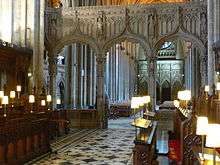Diurnal offices

Traditionally, Christian monastics prayed the Divine Office in the quire of the church
In Anglican and Methodist Christianity, the Diurnal offices (Ecclesiastical Latin: horæ diurnæ) are the canonical hours prayed during the daytime.[1] These offices include Terce, Sext, and None.[2] The diurnal offices stand in contrast to the Major Hours, which include Matins (Morning Prayer), Lauds and Vespers, as well as the Nighttime Hours, which include Compline and Vigil.[3][4]
See also
References
- ↑ Dwight W. Vogel, ed. (2012). The Book of Offices and Services (Fourth ed.). Order of Saint Luke. p. 81. ISBN 1478391022.
The Diurnal Offices: These brief diurnal or daytime offices punctuate the day with prayer. They are prayed in the setting in which we find ourselves, whether at work, as a community gathered for learning or fellowship, or on retreat. While the traditional times for these are at the third, sixth, and ninth hours (that is, at (9:00 am, noon, and 3:00 pm), the exact time for each is variable according to the context of the settings in which we pray them.
- ↑ Lula, Daniel James (2013). "The Anglican Breviary". Retrieved 5 December 2015.
Reciting the "diurnal," or day office, of Terce, Sext and None may be one of the easiest ways for a modern individual to sanctify his or her work-day. The three day Hours, identical in structure, are each much simpler and shorter than any of the Major Hours or Compline. They can easily be recited at their appointed times -- 9 a.m., 12 noon, and 3 p.m. -- aggregated during the lunch hour, or said alone as time permits.
- ↑ Bouscaren, Timothy Lincoln; O'Connor, James I. (1958). The Canon Law Digest: 1958-1962. Bruce. Retrieved 5 December 2015.
Of these, Matins, Lauds and Vespers are called major Hours; Prime, Terce, Sext, None, and Compline, minor Hours.
- ↑ Elizabeth Moore, OSL (ed.). A Lukan Book of Hours: Basic Forms of the Daily Office. Order of Saint Luke. p. 1. ISBN 9781508553014.
The seven "hours" (offices or services) provided by The Order of Saint Luke follow the pattern of the seven hours listed by Basil the Great in the fourth century. There are two principal hours (Morning Prayer and Evening Prayer), three diurnal or daytime hours (mid-morning, mid-day, and mid-afternoon), and two nocturnal or nighttime hours (compline and vigil).
This article is issued from
Wikipedia.
The text is licensed under Creative Commons - Attribution - Sharealike.
Additional terms may apply for the media files.
